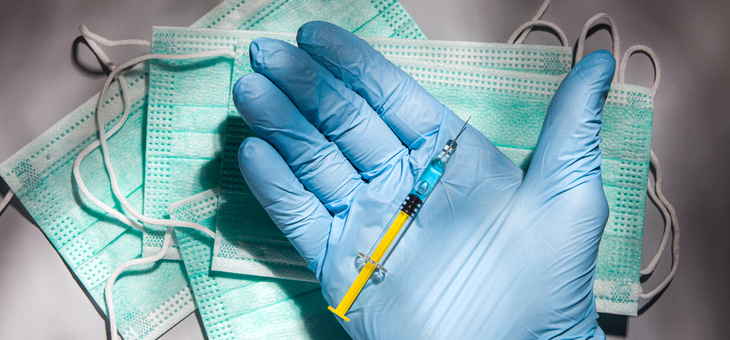Nations could be taking dangerous shortcuts in the race to develop a COVID-19 vaccine.
The BBC reports that ‘vaccine nationalism’ could be driving espionage, unethical risk-taking and jealousy as Russia, the US, the UK, and China conduct trials seeking “one of the most valuable and eagerly sought after medical prizes in modern times”.
“I have never seen the political stakes for a medical product being so intense,” said Lawrence Gostin, professor of global health law at Georgetown University in the US.
“The reason the COVID-19 vaccine has taken on such political symbolism is that the superpowers have seen the vaccine as projecting their scientific prowess, actually validating their political system as superior.”
Nine media reports that Russia’s plan to implement its ‘Sputnik-V’ COVID-19 vaccine before full trials “may encourage the novel coronavirus to mutate”.
“Less than complete protection could provide a selection pressure that drives the virus to evade what antibody there is, creating strains that then evade all vaccine responses,” said Ian Jones, a virology professor at Britain’s Reading University.
“In that sense, a poor vaccine is worse than no vaccine.
“If (a vaccine) is completely sterilising, the virus can’t get in, so it can’t learn anything because it never gets a chance,” he said. “But if it gets in and replicates … there is selection pressure for it to evade whatever antibodies have been generated by the inefficient vaccine. And you don’t know what the outcome of that will be.”
Dan Barouch, a specialist at Harvard’s Beth Israel Deaconess Medical Centre in Boston, said there were many potential downsides of using a vaccine that doesn’t work.
“The risk that it (the virus) would mutate is a theoretical risk.”
Sputnik-V’s developers, financial backers and Russian authorities say their vaccine is safe after two months of small-scale human trials. But the results of those trials have not been shared and many Western scientists are warning against its use until all internationally approved processes have been completed.
“You want to make sure the vaccine is effective. We really don’t know that (about the Sputnik vaccine),” said Kathryn Edwards, a professor of paediatrics and vaccine expert in the infectious diseases division at Vanderbilt University School of Medicine in the US.
The World Health Organization (WHO) says there are currently late-stage trials of six potential vaccines: three in China, one in the UK, one in the US, and a German-US partnership.
It normally takes years to develop a vaccine.
There were accusations of hacking by Russian and Chinese spy agencies of Canadian and American vaccine research in July.
Thomas Bollyky, director at the Council on Foreign Relations, an independent think tank, said the Russians had taken shortcuts.
“It is not hard to develop a vaccine. It is hard to prove that a vaccine is safe and effective,” he said.
The White House’s coronavirus taskforce figurehead, Dr Anthony Fauci, said he seriously doubted the Russians had proven the safety of their vaccine. The developers of the Russian vaccine have vowed they will soon publish their data in a leading scientific magazine.
Dr Fauci is confident a vaccine will be available by the end of 2020. He told Nine Media’s Sixty Minutes program that this could be achieved in less than a year, without cutting corners, because of advances in technology.
On Monday, the US Food and Drug Administration (FDA) fast-tracked approval of the use of ‘convalescent plasma therapy’, despite what were described as serious limitations in studies about its efficacy.
Plasma is the liquid component of blood.
STATnews explains: “When people get sick with COVID-19, their immune systems generate antibodies to fight the disease. Those antibody proteins float in their blood plasma. Doctors can harvest the plasma, test it for safety and then purify it to isolate those antibodies. That ‘plasma-derived therapy,’ or ‘convalescent plasma,’ can be injected into another patient sick with COVID-19, and the antibodies it contains can help fight the virus early in an infection until the patient’s own immune system generates its own antibodies in sufficient quantities to beat back COVID-19.”
US President Donald Trump has hailed the FDA’s emergency use authorisation of convalescent plasma therapy as a “truly historic announcement”. But other FDA officials say the treatment requires “adequate and well-controlled randomised trials”.
And infectious diseases physician Associate Professor Stephen Tong of the Royal Melbourne Hospital and the Doherty Institute pointed out some pitfalls in the process.
He told ABC radio that taking and screening blood products such as plasma was an expensive procedure involving a lot of infrastructure, so you want to know it works.
And we “just don’t have that data”, he said.
The premature promotion of the process also harms further randomised trials, because participants will be reluctant to take a placebo rather than the plasma. He said the announcement will make it “much, much harder to conduct clinical trials” of convalescent plasma therapy.
Do you trust the superpowers to come up with a safe vaccine?
If you enjoy our content, don’t keep it to yourself. Share our free eNews with your friends and encourage them to sign up.
Related articles:
https://www.yourlifechoices.com.au/health/covid19/covid-risk-higher-for-many-this-month
https://www.yourlifechoices.com.au/health/news/hospital-cleaners-share-top-tips
https://www.yourlifechoices.com.au/kitchen-cleaning-mistakes

